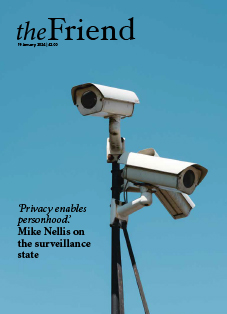
The Friend is a weekly magazine in which Friends speak to each other and to the wider world, offering their insight, ideas, news, nurture and inspiration.
Nurturing Quaker community, each issue offers a space for Friends to share their concerns, and to support each other in faith and witness.
The Friend: enriching, inspiring and connecting the Quaker community since 1843.
Does the Peace Testimony apply in prison? Or, since Gaza, anywhere? Or is it merely a religious relic, with as little relevance as Stonehenge?
The Hebrew Bible is made up of a number of different books, giving different messages. But there is one theme to which I would like to draw your attention.
British Quakers have a longstanding commitment to civil liberties, human rights, and democratic accountability. This is grounded in our testimonies to peace, truth and integrity. In 2020 Quakers in Britain co-signed an open letter to Boris Johnson, then prime minister, expressing concern about: the deteriorating rights of migrants and minorities; threats to the Human Rights Act; and increases in judicial and police power over protestors. These remain live issues. The planned roll-out of controversial facial recognition technology, and the imminent dismantling of democratic accountability over state surveillance, are probably less familiar, but not unconnected. Intrusive technologies are one of the ‘threats to democracy’ recently explored in the BBC’s 2023 Reith lectures. Quakers, I hope, will become more concerned about the ‘invasive technification’ of everyday life.
Local Quakers in Kenya want to build another classroom at Friends School Mfangano (FSM) and reforest their island. The plans are aimed at creating ‘a beacon of hope for our world’, they said.
They lay buried in white dust for two hours
A table flying from the blast settled
Across their bodies as they drifted just
As in a normal bed time calling them
To sleep. The city burned an orange glow
Warm in the night; occasional rumbles
Marked the distance as in summer thunder
Storms across the land punctuating dreams.
They would have slept the coming years away
Unhurt, unknowing who had won the war
Never to have recognised a new day
But for that chap whose spade knocked on the door.
Two souls freed for a spell to live their life
A dusty daughter and an airman’s wife.
William Law (1686-1761) was a priest who lost his position when he found himself unable to swear allegiance to the first Hanoverian monarch. He turned to private teaching, and to writing, influencing authors from Samuel Johnson to John Wesley. Recently, I found a quotation from Aldous Huxley (author of The Perennial Philosophy and Brave New World) talking about Law: ‘What is the ultimate nature of good and evil, and what the true purpose and end of life? The answers to these questions will be given to a great extent in the words of that most surprising product of the English 18th century, William Law… a man who was not only a master of English prose, but also one of the most interesting thinkers of his period and one of the most endearingly saintly figures in the whole history of Anglicanism.’

Become a subscriber to enjoy unlimited access to our articles, dating back to 2009! Online subscribers get the Friend to their inbox each week, can comment on articles, and dive into our 1914-18 digital archive too!
Whether you are new to Quakerism or have been going to Meeting for years, you’ll find something here to inspire, inform and challenge you.
News | Views | Reviews
Written by and for Friends on the bench
Subscribe